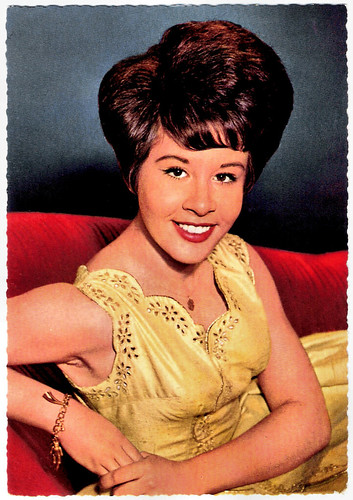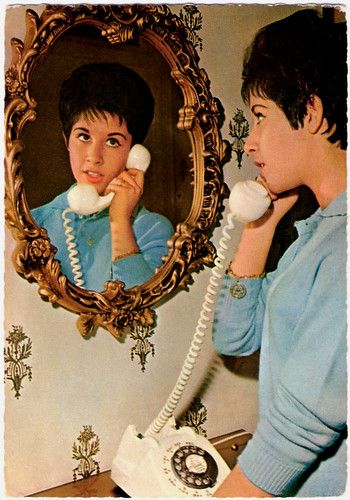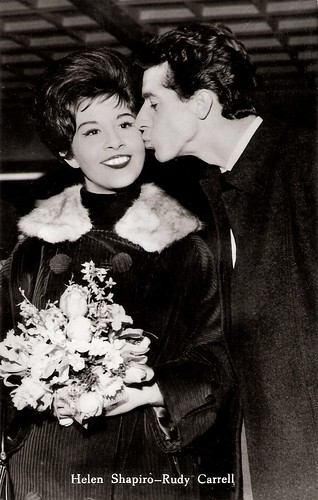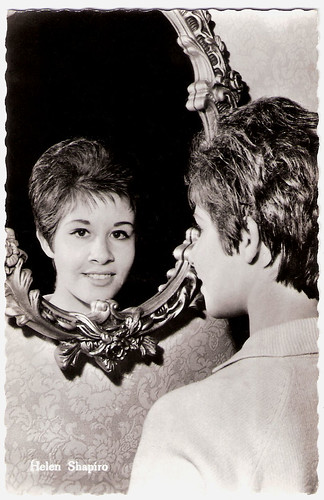
West-German postcard by Krüger, no. 902/175. Photo: Hansi Hoffmann.

Dutch postcard by Gebr. Spanjersberg N.V., Rotterdam.

Belgian postcard by S. Best (SB), Antwerpen.
Foghorn
Helen Kate Shapiro was born in Bethnal Green in the East End of London in 1946. She is the granddaughter of Russian Jewish immigrants, and her parents, who were piece-workers in the garment industry, attended Lea Bridge Road Synagogue. They were too poor to own a record player but encouraged music in their home.
At age 9, Helen performed with a banjo in the school group Susie & the Hula Hoops, whose members included also her cousin, 1960s singer Susan Singer and a young Mark Feld aka Marc Bolan, later of glam-rock band T-Rex. Reportedly, they performed their own versions of Elvis Presley and Buddy Holly songs. She subsequently sang with her brother Ron Shapiro's trad jazz turned skiffle outfit at local clubs before enrolling in classes at Maurice Burman's Academy in London.
Shapiro had a deep timbre to her voice, unusual in a girl not yet in her teens. School friends gave her the nickname ‘Foghorn’. Maurice Burman was so enamoured of Helen’s talent that he waived the fees to keep her as a student. He wrote to several record labels to promote interest in his students. John Schroeder, a young songwriter and A&R man at EMI's Columbia Records, heard her at one of the classes. He was impressed enough to record a demo of Shapiro singing 'Birth of the Blues' and play it back for top EMI producer Norrie Paramor, who had signed Cliff Richard & the Shadows.
Helen Shapiro's voice on the rape was so mature that Paramor refused to believe that it belonged to a 14-year-old girl. So, Helen came to his office in her school uniform and sang 'St. Louis Blues'. Only a few weeks later, she cut her first single, 'Please Don't Treat Me Like a Child', composed by John Schroeder and Mike Hawker. It made number three in the UK charts in May 1961, and the record company’s publicity department made a great play on the novelty value of her age.
Shapiro’s second release, the ballad 'You don’t know', was issued three months later. In August 1961, it made 14-year-old Helen the youngest female artist to reach number one. The song stayed at the top of the charts for two weeks and eventually sold over a million copies. In September that year, she turned 15 and left school to pursue her career in earnest. Live appearances showcased Helen’s assuredness as a performer. She even headlined at the legendary London Palladium, virtually unheard of for such a young, inexperienced entertainer.

Dutch postcard by De Gruyter, no. 8.

Dutch postcard by Gebr. Spanjersberg N.V., Rotterdam.

German postcard by Krüger, no. 902/176. Photo: EMI, London.

French postcard by Editions P.I., Paris, offered by Corvisart, Epinal, no. 1080. Photo: Ektochrome Anders.
A Little Dynamo
Helen Shapiro had her second number one hit in the UK with 'Walkin' Back to Happiness'. It is now her signature song. Her mature voice made her an overnight sensation. The song also became a hit in the rest of Europe and inspired an attempt to crack the American market. However, despite an appearance on the legendary Ed Sullivan Show, the record only reached # 100 in the US charts.
In 1962 she made her debut feature film, It's Trad, Dad!/Ring-A-Ding Rhythm (Richard Lester, 1962). This musical comedy was one of the first films put out by predominantly horror company Amicus Productions, and director Richard Lester's feature debut. Shapiro and singer Craig Douglas play two teenagers who, along with their friends enjoy the latest trend of traditional jazz. However, the mayor as well as a group of adults dislike the trend and move to have a coffee shop jukebox taken away. Helen and Craig decide to organize a music festival in their small town, and the film comprises musical numbers by Chubby Checker, Del Shannon, and Gene Vincent.
Jeff Stafford at TCM: "Any Richard Lester fan can look at It's Trad, Dad and see the fresh and distinctive techniques that would fully emerge in Lester's A Hard Day's Night. For one thing, Lester's playful editing style keeps the viewer constantly engaged while also paying tribute to the musicians on display. (...) Douglas is a pleasant but unremarkable light pop vocalist but Shapiro is a little dynamo with a powerful voice comparable to Brenda Lee."
Shapiro then starred in another teenage musical, Play It Cool (Michael Winner, 1962) featuring Billy Fury and the Satellites and Bobby Vee. Shapiro's next single release, 'Tell Me What He Said', peaked at no. 2, achieving her first four single releases in the top three of the UK Singles Chart. Her final UK Top Ten hit single was with the ballad 'Little Miss Lonely', which peaked at no. 8 for two weeks in 1962.
Before she was sixteen years old, Shapiro had been voted Britain's 'Top Female Singer', and when The Beatles had their first national tour (The Helen Shapiro Tour) in 1963, it was as her supporting act. During the tour, The Beatles hit big and replaced Helen as top of the bill.
Helen later found out that it was around this time that Lennon and McCartney penned 'Misery' for her, but her producer Norrie Paramor declined the offer without informing her. He preferred to release 'Queen for tonight', a firm fan favourite and a much-requested song, but slightly out of step with current trends. It reached a disappointing 33 in the UK charts. In early 1964, her cover of 'Fever' proved her last top 40 hit.

Dutch postcard by Takken, Utrecht, no. 4906. Photo: Columbia.

Helen Shapiro and Rudi Carrell. Dutch postcard by Sparo (Gebr. Spanjersberg N.V., Rotterdam). Sent by mail in the Netherlands in 1966. Photo: Columbia.

Helen Shapiro and Peter Kraus. Dutch postcard, no. 6357. Sent by mail in the Netherlands in 1965.
Musicals, Jazz, Gospel
By the time Helen Shapiro was in her late teens, her career as a pop singer was on the wane. Undaunted, she branched out as a performer in stage musicals, a jazz singer (jazz being her first love musically), and more recently a gospel singer. She also began to concentrate more on stage work.
In the early 1980s, she played the role of Nancy in Lionel Bart's musical, 'Oliver!' in London's West End. Various other musicals, pantomimes, and revival concerts followed. She also continued to tour, especially in mainland Europe and the Far East, where she remained in demand.
Throughout the 1980s she made guest appearances on many TV variety shows, either singing her old songs or promoting the odd new release. Shapiro also appeared in British television soap operas; in particular, Albion Market (1985) where she played one of the main characters up to the time it was taken off-air in August 1986.
In 1987 Shapiro became a committed Christian (Messianic believer). She has issued four Messianic albums since then, and appeared in a number of special Gospel Outreach evenings, singing and telling of how she found Jesus (Yeshua) as her Messiah. Shapiro retired from showbusiness at the end of 2002 to concentrate on her Gospel Outreach evenings.
In 1993, she published her autobiography, 'Walking Back to Happiness'. Since 2015, she has played in a trio called Hebron with Chrissy Rodgers and Simon Elman. They are promoted via Shapiro's ministry umbrella, Manna Music. She was married three times: Duncan C. Weldon (1967-1971), Morris Gundlash (1972-1977), and John Judd (1988-), an actor with numerous roles in British television and cinema. The couple lives in Kent.
Bruce Eder at AllMusic: "Listening to Shapiro's records nearly 40 years later, it's amazing to think that her hit-making career lasted only two years. She was equally at home belting out "The Birth of the Blues," imparting a surprisingly blues-influenced feeling to 'A Teenager in Love', or oozing pre-feminist defiance in 'Walking Back to Happiness', and by rights should have been able to find a niche on the charts well into the middle and late '60s. The incongruity of a 15-year-old who might usually be spending her time in high school doing a song like 'Walking Back to Happiness' was lost in the more innocent era in which she worked."

Dutch postcard by Takken, Utrecht, no. AX 4930.

Dutch postcard, no. 262.

Vintage card.
Helen Shapiro sings 'Walking Back To Happiness' in a Dutch TV show of Rudi Carrell. Part of a short documentary by Top 2000 a gogo from 2003. Source: Dutch Public Television (YouTube).
Sources: Jeff Stafford (TCM - now defunct), Graham Welch (Ready Steady Girls), Bruce Eder (AllMusic), Wikipedia, and IMDb.
No comments:
Post a Comment